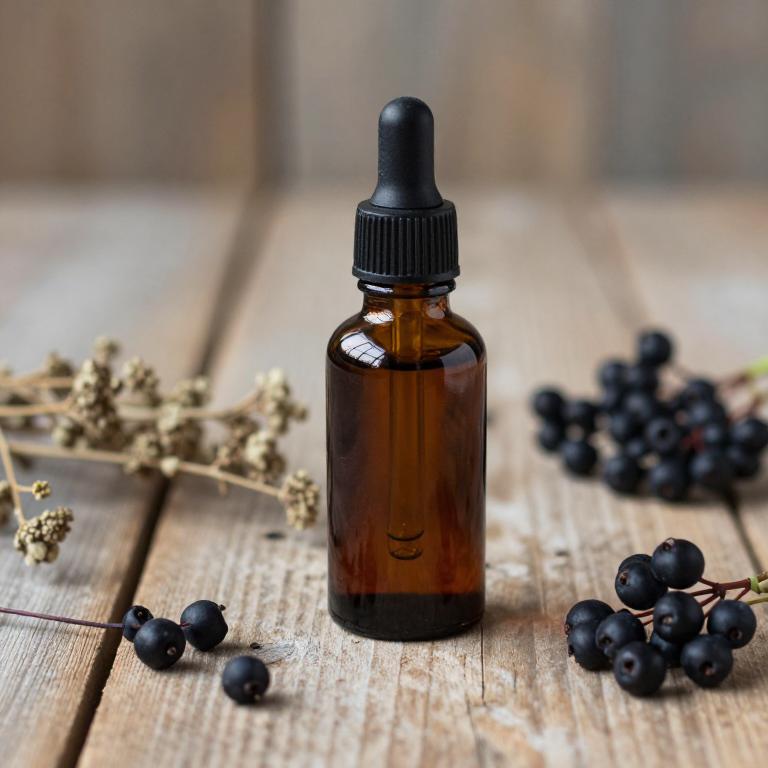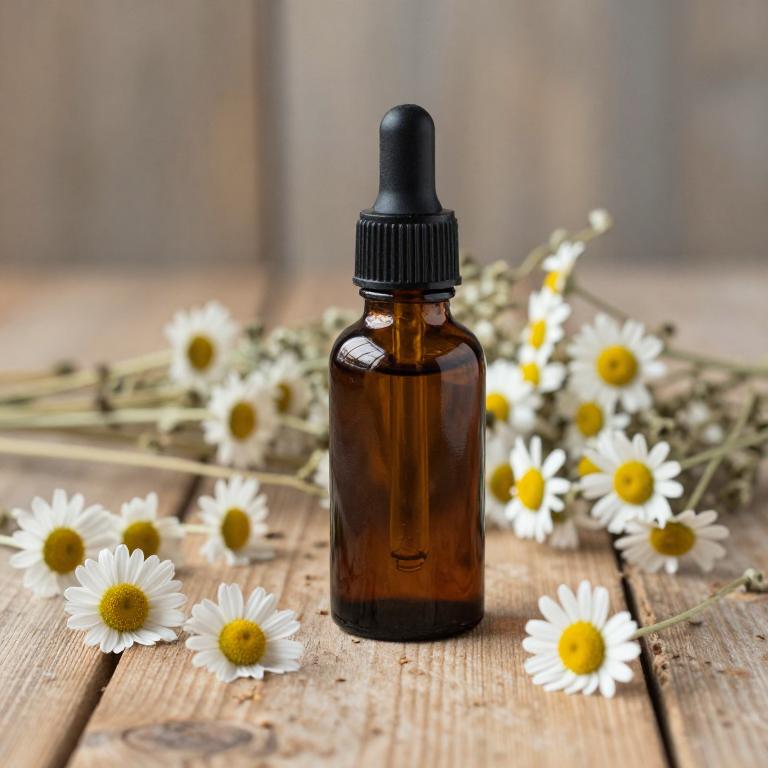10 Best Herbal Tinctures For Dry Throat

Herbal tinctures are concentrated liquid extracts made from various medicinal plants, often used to soothe a dry throat and alleviate discomfort.
Common herbs used in these tinctures include echinacea, licorice root, and sage, each known for their anti-inflammatory and soothing properties. These tinctures can be taken orally, typically diluted in water or tea, to provide quick relief from irritation and dryness. They are often preferred for their natural ingredients and minimal side effects compared to over-the-counter medications.
Regular use of herbal tinctures may help reduce the frequency and severity of dry throat symptoms, especially when caused by environmental factors or minor illnesses.
Table of Contents
- 1. Echinacea (Echinacea purpurea)
- 2. Licorice (Glycyrrhiza glabra)
- 3. Chaste tree (Vitex agnus-castus)
- 4. Black elderberry (Sambucus nigra)
- 5. Ginger (Zingiber officinale)
- 6. Thyme (Thymus vulgaris)
- 7. Rosemary (Rosmarinus officinalis)
- 8. Stinging nettle (Urtica dioica)
- 9. Chamomile (Matricaria chamomilla)
- 10. Salvia (Salvia officinalis)
1. Echinacea (Echinacea purpurea)

Echinacea purpurea, commonly known as purple coneflower, is a popular herb used in tincture form to support immune health and alleviate symptoms of a dry throat.
These herbal tinctures are typically made by steeping the dried roots and flowers of the plant in alcohol, creating a concentrated extract that can be taken orally. The active compounds in echinacea, such as alkamides and polysaccharides, are believed to have anti-inflammatory and immune-boosting properties that may help reduce throat irritation. Many people use echinacea tinctures as a natural remedy to soothe a dry, scratchy throat caused by colds or allergies.
However, it is important to consult with a healthcare provider before use, especially for those with allergies or on medication.
2. Licorice (Glycyrrhiza glabra)

Glycyrrhiza glabra, commonly known as licorice root, is a widely used herb in traditional medicine for its soothing properties.
Licorice root tinctures are often recommended for alleviating dry throat symptoms due to their ability to coat and moisten the throat lining. The herb contains glycyrrhizin, which has anti-inflammatory and demulcent effects that can reduce irritation and coughing. Additionally, licorice tinctures may help stimulate mucus production, making them useful for dry, non-productive coughs.
However, long-term use should be monitored, as excessive intake of licorice can lead to side effects such as hypertension.
3. Chaste tree (Vitex agnus-castus)

Vitex agnus-castus, commonly known as chasteberry, has been traditionally used in herbal medicine for its potential calming and hormonal balancing properties.
While it is not a direct treatment for dry throat, some individuals may find relief from its soothing effects on the respiratory system. Herbal tinctures made from vitex can be used as a complementary therapy to support overall throat health and reduce irritation. These tinctures are often taken orally, diluted in water, and may help alleviate mild dryness and discomfort.
It is important to consult with a healthcare provider before using vitex tinctures, especially if you have underlying health conditions or are taking other medications.
4. Black elderberry (Sambucus nigra)

Sambucus nigra, commonly known as elderberry, is a traditional herbal remedy that has been used for centuries to support respiratory health.
Its tinctures are often utilized for alleviating symptoms of a dry throat due to their anti-inflammatory and immune-boosting properties. The active compounds in elderberry, such as flavonoids and anthocyanins, help reduce inflammation and soothe irritated mucous membranes. When taken as a tincture, elderberry can provide a quick and concentrated dose of these beneficial compounds.
However, it is important to consult with a healthcare professional before use, especially for those with existing health conditions or taking other medications.
5. Ginger (Zingiber officinale)

Zingiber officinale, commonly known as ginger, has been widely used in traditional medicine for its soothing and anti-inflammatory properties.
Ginger herbal tinctures are often recommended for alleviating symptoms of a dry throat due to their ability to reduce irritation and promote a sense of relief. The active compounds in ginger, such as gingerol and shogaol, help to increase saliva production and ease discomfort caused by dryness or inflammation. These tinctures can be easily incorporated into daily routines by adding a few drops to water or tea.
While generally safe, it is advisable to consult a healthcare professional before use, especially for individuals with existing medical conditions or those taking medications.
6. Thyme (Thymus vulgaris)

Thymus vulgaris, commonly known as thyme, is a popular herb used in traditional medicine for its various therapeutic properties.
Thymus vulgaris herbal tinctures are often utilized to alleviate symptoms of a dry throat due to their antimicrobial and soothing effects. These tinctures contain essential oils like thymol, which can help reduce inflammation and irritation in the throat. The natural antioxidants in thyme also support immune function, making it beneficial for overall respiratory health.
When used as a complementary remedy, thymus vulgaris tinctures may provide relief from dryness and discomfort associated with throat irritation.
7. Rosemary (Rosmarinus officinalis)

Rosmarinus officinalis, commonly known as rosemary, is a versatile herb that has been traditionally used for its therapeutic properties, including its ability to soothe a dry throat.
Rosemary herbal tinctures are concentrated extracts made by soaking the dried leaves in alcohol, which helps preserve the plant's active compounds. These tinctures contain essential oils like camphor and rosmarinic acid, which have anti-inflammatory and antimicrobial properties that can reduce irritation and infection in the throat. When used as a gargle or diluted in water, rosemary tinctures may provide relief from dryness, soreness, and inflammation associated with throat conditions.
However, it is important to consult with a healthcare professional before using these tinctures, especially for prolonged or chronic throat issues.
8. Stinging nettle (Urtica dioica)

Urtica dioica, commonly known as stinging nettle, is a versatile herb that has been traditionally used for its medicinal properties, including soothing a dry throat.
When prepared as a tincture, Urtica dioica can provide a concentrated form of its beneficial compounds, such as flavonoids and minerals, which may help reduce inflammation and irritation in the throat. The tincture is typically made by soaking the dried leaves in alcohol, allowing the active compounds to be extracted over time. It is often used as a natural remedy for coughs, sore throats, and other respiratory discomforts due to its mild antihistamine and demulcent effects.
However, it is important to consult with a healthcare provider before use, especially for those with allergies or taking other medications.
9. Chamomile (Matricaria chamomilla)

Matricaria chamomilla, commonly known as chamomile, is a popular herb used in tinctures to soothe dry throat discomfort.
Its calming properties help reduce inflammation and irritation in the throat, making it an effective natural remedy for dryness and soreness. Chamomile tinctures are typically made by steeping the dried flowers in alcohol, allowing the active compounds to extract into the liquid. These tinctures can be taken orally in small doses or used as a gargle to provide relief.
Due to its gentle and soothing nature, chamomile tinctures are often recommended for individuals seeking a safe and natural alternative to over-the-counter throat lozenges.
10. Salvia (Salvia officinalis)

Salvia officinalis, commonly known as sage, has been traditionally used for its soothing properties, making it a popular ingredient in herbal tinctures for dry throat relief.
These tinctures typically combine sage with alcohol to extract its essential oils and active compounds, such as thujone and flavonoids, which have antimicrobial and anti-inflammatory effects. When used as a gargle or diluted in water, sage tinctures can help reduce throat irritation and promote healing by decreasing mucus production and soothing inflamed tissues. Many people find relief from chronic dry throat symptoms by using sage tinctures regularly, often in combination with other herbal remedies.
However, it is important to consult a healthcare provider before use, especially for those with existing medical conditions or taking medications.